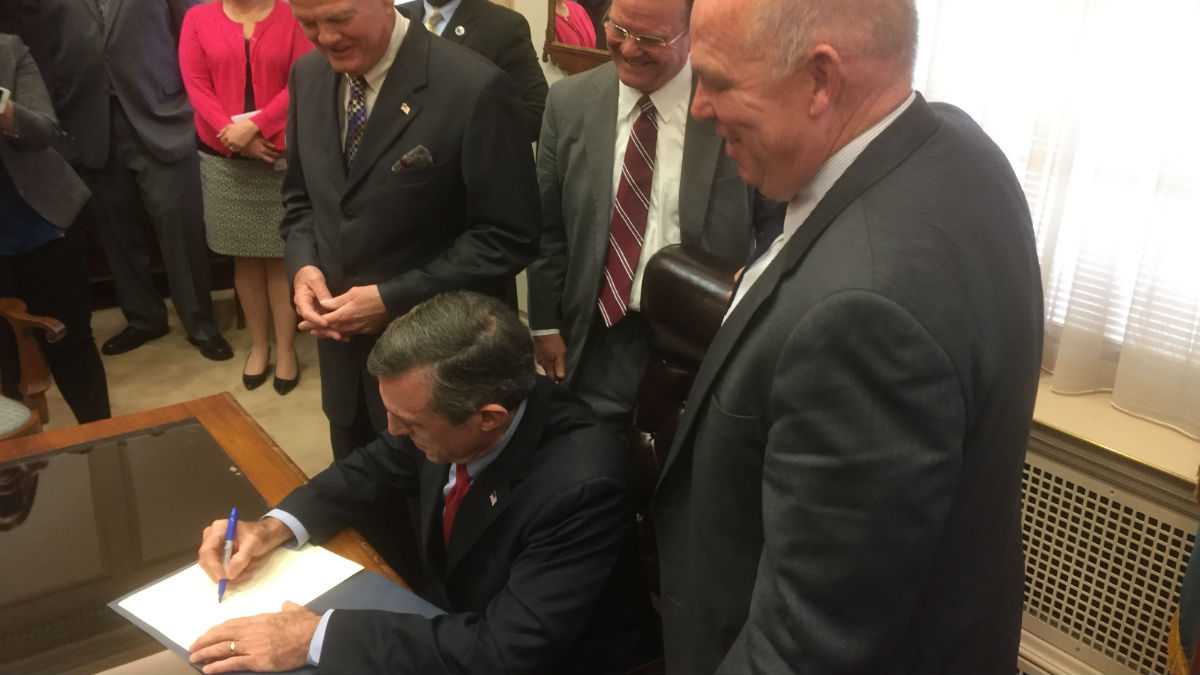Gov. Carney to eliminate DEDO as part of new economic development plan

Gov. Carney signs his first executive order in January. The order created a 14-member working group to develop recommendations for implementing a public-private partnership. (Zoe Read/WHYY)
Delaware’s Governor wants to eliminate DEDO as part of a new strategic plan to improve the economy.
Gov. John Carney, D-Delaware, is eliminating the Delaware Economic Development Office, known as DEDO, as it shifts responsibilities to a new state entity, alongside efforts to improve economic development through a new public-private partnership.
Carney announced the plan Wednesday that aims to promote innovation, support Delaware’s entrepreneurs and leverage private sector resources to create jobs and grow Delaware’s economy.
“We can and should do more to promote innovation, support our entrepreneurs, build and retain a talented workforce in Delaware, and strategically partner with the private sector to grow the state’s economy,” Carney said in a statement. “This plan will position Delaware to create good-paying jobs, build an entrepreneurial ecosystem and keep our state a competitive place to do business.”
In January, the Governor signed his first executive order to create a 14-member working group to develop recommendations for implementing a public-private partnership, now known as the Delaware Prosperity Partnership.
The executive order followed recommendations offered last year by Delaware’s Business Roundtable that state government create partnerships with the private sector to address changes in the state’s economy, as companies like DuPont ordered layoffs.
On Wednesday, Carney said he will work with the General Assembly to approve the concept and funding for the partnership, which would cost $2 million annually and $1 million in annual funding from private business.
Contributions from the state would remain contingent on an ongoing, annual financial commitment from the private sector.
The partnership would lead business marketing efforts to recruit and retain businesses, including early-stage technology-based ventures and large employers.
The group also would provide support for startup businesses, with an emphasis on high-growth industries, and work with employers and education institutions to grow Delaware’s workforce.
Carney also said he would work with legislators to create a new division at the Department of State to oversee responsibilities for small business development and tourism, eliminating the need for DEDO.
“This is about positioning Delaware to be competitive for good jobs moving forward,” said Jeff Bullock, Delaware’s Secretary of State, in a statement. “By strategically partnering with the private sector, we can leverage business resources to strengthen the state’s economic development efforts, while continuing to support small business owners and promote our state’s $3 billion tourism industry.”
The new division will support small businesses, especially those that are women, minority and veteran-owned, Carney said. The division will aim to help business owners identify available resources and navigate local, state and federal rules and regulations, he said.
Division leaders also will administer Delaware’s publicly-funded economic development incentive programs, such as the Strategic Fund, the Main Streets program and the Blue Collar Workforce Training grant program.
The goal is to implement the economic development plans by early 2018.
“This plan offers a real chance to dramatically re-think the way Delaware does business – by leveraging additional resources, and bringing more ideas to the table as we seek to grow our economy, attract talent to our state, and create good-paying jobs for all Delawareans,” said Rod Ward, President of Corporation Service Company, and co-chair of the Economic Development Working Group.
“Private businesses are ready and willing to be a full partner in this effort, and help create the kind of entrepreneurial, innovation-based economy that will lead to real growth.”
Several legislators say they’re in support of the economic development plan. State Sen. Jack Walsh, D-Stanton, a member of the working group, said there’s always room for improvement.
“Bringing leaders from the private sector to the table adds a valuable new perspective to our economic development strategy and will help make our economy more dynamic over time. At the same time, Delaware is maintaining its firm commitment to empowering women, minority, and veteran-owned small businesses,” he said.
“Not all public-private partnerships are created equal, but the balance that we’ve struck here not only protects existing businesses and jobs, but also gives us a leg up in attracting promising new industries to our state.”
Rep. Lyndon Yearick, R-Dover South, also a member of the working group, said the partnership will create innovative ways to improve the economy.
“This is not an end, it is a beginning,” Yearick said. “Bringing the pragmatic knowledge of entrepreneurs into the process of creating a better business environment is a major step forward. Now we need to do realize the promise this concept holds for creating new, dynamic employment in Delaware.”
WHYY is your source for fact-based, in-depth journalism and information. As a nonprofit organization, we rely on financial support from readers like you. Please give today.





